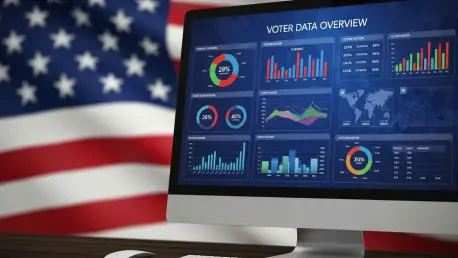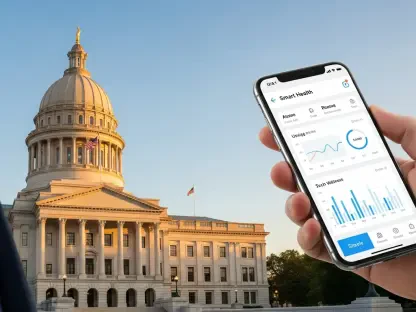Imagine a scenario where the federal government seeks access to highly personal voter information—details like driver’s license numbers and partial Social Security numbers—from every state in the nation, sparking a heated debate over privacy and state rights. This isn’t a hypothetical; it’s the reality unfolding as the U.S. Department of Justice (DOJ) under the Trump administration issues sweeping demands for voter data. The response from Republican-led states varies widely, igniting a firestorm of debate over state autonomy, privacy rights, and election integrity. This roundup article gathers insights, opinions, and analyses from a range of perspectives to dissect why some GOP states are pushing back against these federal requests and what it means for the democratic process. By exploring diverse viewpoints, the goal is to shed light on this complex clash and its broader implications.
Diving into the Federal-State Tension
The core of this controversy lies in the tug-of-war between federal authority and state control over elections. Many observers note that the U.S. Constitution explicitly delegates election administration to states, a principle long cherished by conservatives. Yet, the DOJ’s push for detailed voter data is seen by numerous state officials as a challenge to that authority. Some argue that complying with such demands risks setting a dangerous precedent for federal overreach into local governance.
A variety of opinions emerge on how this balance should be struck. Certain policy analysts emphasize that states have legitimate reasons to resist, pointing to the lack of clear legal grounding for the DOJ’s requests. Others highlight that even among Republican states, the response isn’t uniform—some fully comply, while others limit data shared to publicly available records. This spectrum of reactions underscores a deeper uncertainty about where the line between federal oversight and state sovereignty should be drawn.
The political stakes add another layer of complexity. Several commentators suggest that the pressure to align with the Trump administration’s agenda creates a dilemma for GOP officials who also prioritize state independence. This tension reveals a broader ideological struggle within the party, as officials weigh loyalty against long-standing conservative values of limited federal power.
Privacy Concerns at the Forefront
Widespread Unease Over Data Misuse
A significant point of contention across political lines is the potential misuse of voter information. Many voices in the election integrity community express alarm over how such sensitive data could be exploited, whether for creating federal databases or targeting specific voter groups. The fear is that once this information leaves state hands, there’s little control over its application.
Another concern raised by privacy advocates centers on the DOJ’s collaboration with other federal agencies, such as the Department of Homeland Security. Critics argue that this sharing amplifies risks of surveillance and erodes public confidence in the electoral system. The consensus among these voices is that transparency about data usage is sorely lacking, fueling skepticism about the administration’s intentions.
Balancing these fears against the stated goal of preventing voter fraud proves challenging. Some defenders of the DOJ’s actions assert that accurate voter rolls are essential for secure elections. However, opponents counter that the rarity of fraud cases doesn’t justify the potential invasion of privacy, leaving a divide on whether the ends truly justify the means.
Impact on Public Trust
The ripple effects on public trust in elections are a recurring theme in discussions. Several election observers warn that mishandling voter data could deepen existing doubts about the fairness of the democratic process. This concern resonates across party lines, with many stressing that any perception of political targeting could alienate voters.
Differing perspectives emerge on how to mitigate this risk. A segment of analysts advocates for strict, publicly disclosed guidelines on how federal agencies handle voter information. Others believe states should retain ultimate control, arguing that local oversight is more accountable to constituents. These varied suggestions highlight the urgency of addressing trust as a cornerstone of democracy.
The debate also touches on historical context, with some pointing out that past federal initiatives to centralize voter data have often met resistance due to similar privacy fears. This recurring pattern suggests that without clear safeguards, public apprehension will likely persist, shaping state responses to current demands.
Political Dynamics Within the GOP
Navigating Party Loyalty and Local Priorities
Within Republican circles, the influence of Trump’s leadership looms large over state decisions. Numerous political analysts observe that GOP officials face intense pressure to align with the administration’s priorities, even when personal or constituent views on state autonomy conflict. This dynamic creates a tightrope for many state leaders.
Contrasting opinions surface on how this loyalty plays out. Some argue that full compliance with DOJ requests is often a strategic move to curry favor with the party base. Others note that resistance, or at least partial compliance, can also be politically motivated, as officials aim to appeal to voters wary of federal overreach. These differing strategies reveal the nuanced calculations at play.
A further layer of insight comes from examining individual state contexts. Commentators point out that local political ambitions—such as gubernatorial aspirations—often shape how officials respond, sometimes outweighing party expectations. This variety in decision-making illustrates that national party influence doesn’t always translate to uniform action at the state level.
Ideological Conflicts in Play
The ideological rift within the GOP adds depth to the resistance narrative. Many conservative thinkers emphasize that the principle of states’ rights remains a bedrock value, often clashing with federal directives. This conflict is evident as some state leaders publicly champion local control while privately navigating party expectations.
Divergent views on resolving this rift are apparent. Certain factions within the party advocate for a unified stance supporting the administration to project strength on election integrity. Conversely, others call for a recommitment to decentralized governance, viewing resistance as a defense of core Republican ideals. This internal debate underscores the complexity of the issue.
Beyond ideology, practical considerations also influence state positions. Some GOP officials, according to political observers, weigh the legal and logistical challenges of compliance against the potential backlash from constituents. This pragmatic approach often results in a middle-ground stance, further fragmenting the party’s response to federal demands.
Legal and Policy Implications Explored
Uncertainty Surrounding DOJ Authority
The legal foundation of the DOJ’s voter data requests remains a hotly contested topic. A range of legal scholars and election policy experts question whether federal law explicitly supports such broad access to state records. This uncertainty fuels ongoing resistance from both Republican and Democratic states.
Litigation is already shaping the landscape, with lawsuits targeting non-compliant states. Some analysts predict that these legal battles could set significant precedents for federal-state relations in election oversight. Others caution that prolonged court fights risk further polarizing an already divided electorate on issues of voting rights.
A third perspective focuses on historical parallels, noting that previous attempts by administrations to centralize election data have often been struck down or heavily contested. This backdrop suggests that current legal challenges may follow a similar trajectory, with outcomes likely to redefine the scope of federal authority in the coming years.
Long-Term Policy Consequences
Looking beyond immediate legal disputes, the policy ramifications of this controversy draw significant attention. Many policy experts warn that conceding to federal data demands could pave the way for broader national control over elections, a shift that could alter democratic structures.
Alternative viewpoints stress the need for a balanced approach. Some suggest that federal-state partnerships, with clearly defined roles, could address concerns about voter fraud without undermining state autonomy. Others argue for legislative action to codify limits on federal access to voter data, ensuring privacy protections are enshrined in law.
The diversity of opinions on long-term impacts reflects the stakes involved. A common thread among commentators is the recognition that decisions made now will influence election administration for decades. This shared understanding underscores the importance of crafting policies that prioritize both security and individual rights.
Key Takeaways From the Roundup
Reflecting on the myriad perspectives gathered, several critical insights emerge from this exploration of GOP states’ resistance to DOJ voter data demands. The spectrum of state responses—from full compliance to outright refusal—highlights the deep tension between federal oversight and state sovereignty. Privacy concerns unite voices across political divides, with many fearing the erosion of public trust if sensitive information is mishandled. Legal ambiguities surrounding the DOJ’s authority fuel further debate, while political dynamics within the Republican Party reveal a complex interplay of loyalty and local priorities. As these discussions unfold, it becomes clear that the outcomes of this clash will resonate far beyond immediate policy, shaping the future of election integrity and data privacy in American democracy. For those eager to dive deeper, exploring state-specific election laws and following ongoing legal challenges offers a valuable next step in understanding this evolving issue.









